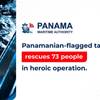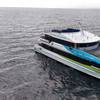An international fund is urgently needed in order to establish search and rescue (SAR) services along the African coastlines, including the setting up of up to five regional Maritime Rescue Co-ordination Centres (MRCCs) and 26 Maritime Rescue Sub-Centres (MRSCs), the IMO Maritime Safety Committee (MSC) has agreed.
MSC Chairman Mr. Tom Allan (United Kingdom) said the Committee would recommend to the IMO Council, which meets in June, that an international SAR Fund is established as soon as possible to support the establishment and continued maintenance of the MRCCs and MRSCs in Africa. The aim is to ensure that the basic communications infrastructure and trained personnel are put in place in order to co ordinate any search and rescue operation and to assist any persons in distress at sea in the waters of the Atlantic and Indian Oceans adjacent to the African coast.
"I am delighted with today's decision of the Committee to recommend to the Council the establishment of an International SAR Fund. Once established, such Fund will assist countries which do not have the resources to put into place an adequate SAR infrastructure and will then fill a gap in IMO's efforts to establish the global SAR plan on a realistic, efficient and effective basis. The issue is one of a profound humanitarian nature and the Committee's decision has a historical value," Mr. Allan said.
The proposal to consider establishing a SAR Fund to boost SAR services along the African coastlines was initially included in a resolution adopted by a Conference on Maritime Search and Rescue (SAR) and the Global Maritime Distress and Safety System (GMDSS), organized by IMO in Florence, Italy in October 2000.
As well as the establishment of the MRCCs and MRSCs, the SAR Fund would also provide for the continued maintenance of an effective global system for the distribution of distress-alert data and appropriate operational information via publicly accessible or dedicated communications networks; databases for the operation of the GMDSS and SAR professional and technical training resources; and other resources deemed necessary for the effective implementation of the Global SAR Plan.
IMO is currently developing a pilot project under its Integrated Technical Co-operation Programme (ITCP) to establish and operate a regional MRCC in Mombasa, Kenya and two MRSCs in the Seychelles and Tanzania.
The project is centred around co-operation between all stakeholders in the SAR services of the sub-region, including the International Civil Aviation Organization (ICAO), IMO, the International Lifeboat Federation (ILF), private donors (e.g. through Inmarsat and the International Mobile Satellite Organization (IMSO)) and the host countries concerned. It is envisaged that IMO will be the project leader, co-operate with all parties concerned and co ordinate the various responsibilities in the provision of expert advice, training and infrastructure and will provide the necessary supervisory services.
The experience gained following the successful establishment and operation of the regional MRCC and MRSCs for East Africa would then serve as an example for other African regions and elsewhere in the world to follow and provide a better picture of the actual SAR Fund requirements.
The objective of the 1979 SAR Convention was to provide a global system for responding to emergencies and the GMDSS was established to provide it with the efficient communication support it needs. To help implement the SAR Convention, IMO's Maritime Safety Committee (MSC) has divided the world's oceans into 13 search and rescue areas, in each of which the countries concerned have delimited search and rescue regions for which they are responsible. Provisional search and rescue plans for all of these areas were completed by 1998 and the aim is to achieve full and effective implementation of these plans.
The GMDSS - which became fully effective from 1 February 1999 - is essentially a worldwide network of automated emergency communications for ships at sea. The basic concept is that search and rescue authorities ashore, as well as shipping in the immediate vicinity of the ship in distress, can be rapidly alerted through satellite and terrestrial communication techniques to a distress incident so that they can assist in a coordinated SAR operation with the minimum of delay.
Sponsored Content
Innovative Hull Maintenance: Profitable & Green

Subscribe for
Maritime Reporter E-News
Maritime Reporter E-News is the maritime industry's largest circulation and most authoritative ENews Service, delivered to your Email five times per week












